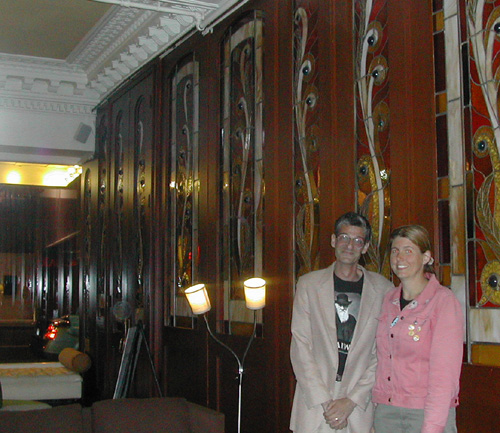It has recently transpired that I will be teaching (and before that, designing and constructing) a brand new ethics module in the large introduction to engineering class at my university that all the freshman who are majoring in any of the multitude of engineering disciplines must take. I’m jazzed, of course, that the College of Engineering thinks that it’s worth cultivating in their students the idea that ethics is an integral part of being a good engineer (and a good engineering student), so much so that they are devoting two weeks in the fifteen week term to this. And, I want to do a good job pitching the material to the audience.
I have some experience teaching to frosh. But it occurs to me that I’m a little fuzzy in understanding just what makes an engineer an engineer.
Author Archives: admin
Random bullets of “AAAAARGH!!”
I would like to rejoice that it is Friday. And yet, as the end of the semester draws nigh, the press of Tasks That Cannot Be Deferred Any Longer is sucking a good bit of the Friday-ness out of this Friday.
So, I suppose this post is the cyber-equivalent of an itemized primal scream:
Friday Sprog Blogging: science flutters by
Younger offspring: (brandishing a decorated and labeled paper plate) You’re going to blog about this on Friday.
Dr. Free-Ride: I am?
Younger offspring: Yes! It has to do with science, and I made it.
Dr. Free-Ride: (pretending to think it over) Well, I don’t know …
Younger offspring: And this way, you don’t have to get us to draw you pictures on Friday morning when we’re supposed to be getting ready for school.
Dr. Free-Ride: Ah, so you’re saving me time? OK, I’m convinced.
My dinner with Bora.

I got a chance to have dinner with Bora last night in San Francisco on the eve of his job interview with PLoS ONE. This gave us the opportunity for a free-wheeling discussion about the potential of new technologies to change the ways scientists communicate with each other (and with non-scientists), the ways that conversations (and drawing people into them) aren’t coupled too tightly to the fancy technical thingies (the “aps”) that carry them through cyberspace, the ways that interfaces and functionality can exert subtle influences on the ways people interact with ideas and with each other, and all sorts of other issues pedagogical and blogospheric. There were also a number of gratuitous references to “framing” and “memes”.
PLoS arranged for Bora to stay at The Mosser (in whose lobby we are pictured above). It’s one of those great small hotels that San Francisco has a bunch of, and the lobby feels like something out of a classic movie.
As I hit the “publish” button, Bora will be starting his action-packed day with the PLoS folks — wish him luck!
What they said at the panel on the future of higher education.
Since many of you were kind enough to suggest questions to ask of Margaret Spellings at SJSU’s Founders Day “The Future of Higher Education” panel last Friday, I thought I should report back on that session.
First, the bad (but utterly predictable) news: while Margaret Spellings gave the keynote address, she didn’t stick around for the panel discussion afterwards — so she wasn’t there for the question and answer period. However, the panel of experts certainly had something to say about the Spellings Commission report on higher education.
Separating the public and private spheres.

Depending on your blog reading habits, you may already have heard the news that feels almost like cosmic justice that a law firm has rescinded an offer of employment from a third year law student whose online activities the firm found troubling. The linked posts will give you some flavor for those activities (as will this post), so I’m not going to go into the gory details here. However, I wanted to say a few words about this comment Amanda Marcotte made on Sheezlebub’s post on the matter:
While it couldn’t have happened to a nicer guy, I simply have to voice my unease with the politics of personal destruction, even when done for the right cause. Getting people fired is the right’s strategy. (I know.) Scalp-collecting bothers me to no end. Granted, we didn’t do anything to get him fired, but needless to say, I have to protest any and all attempts in the future to separate a person from his job because of his opinions in a non-work capacity.
(Bold emphasis added.)
You may recall that Amanda left her job with the Edwards campaign because Bill Donohue’s Catholic League decided to make Amanda’s personal views into a big issue for Edwards. (Arguably, Donohue did this by misrepresenting her views, which strikes me as an ethical violation of the bearing-false-witness variety, but I’m just giving you the background for Amanda’s comment.)
Anyway, the issue I want to examine is the separation between work and non-work conduct and opinions, especially as they are manifested on the internet.
Friday Sprog Blogging: the future.
The Free-Ride offspring, talking during dinner:
Younger offspring: I’m not ever going to die.
Elder offspring: You don’t know that. You might get hit by a car just before you turn 90.
Younger offspring: No, I will not!
Elder offspring: How can you be sure? Have you gone into the future to see?
Younger offspring: I’m not going to the future!
Dr. Free-Ride: Are you planning to wake up tomorrow?
Younger offspring: Yes.
Dr. Free-Ride: Then you’re going to the future.
In case you’re desperate for something to read …
I have a couple posts brewing, but they will be delayed by my pile of scut work. Meanwhile, I have a new post at WAAGNFNP with my thoughts about why the (unionized) faculty in my university system took such a long time to feel ready to strike. It’s something you can read while you dodge your own stack of scut work.
How easy would it be to dig yourself out of this hole?

We just hit the point in the semester where my “Ethics in Science” class discusses the novel Cantor’s Dilemma by Carl Djerassi. For those who inhabit the world of scientific research — and for those who don’t but are hungry for an insight to how human relationships and scientific activities are entwined — it’s a nice little novel. (Indeed, I’ve discussed it already in a couple other posts.)
What I’m going to discuss in this post is a situation that’s pretty much at the end of Cantor’s Dilemma, a situation where my view of what was most likely to happen after the last page (in Novel-land, where the fictional characters go on with their lives after we close the book and put it back on the shelf) turns out to be very, very different from my students’ views of how things would probably go for those characters. I’m curious to know whose reading of the likely outcomes seems most reasonable.
But, to lay that out, I need to give you details about where things are at the end of Cantor’s Dilemma.
If you have not yet read Cantor’s Dilemma, and if there is even a remote possibility that you might read Cantor’s Dilemma at some point in the future, and if knowing how the novel ends has any non-zero probability of taking the fun out of your future reading of this novel (as I imagine it would for me), then for goodness sake do not read any further in this post! This post will be loaded with spoilers. Not just minor spoilers, either. To really explain the situation at the end of the novel about which my students and I disagree, I need to spoil most of what there is to spoil.
I’ve warned you. Choose carefully.
Some quick thoughts on undergraduate research.
Jake, Chad, and Rob have posted about a newly published study about the benefits of research experiences for undergraduates. The quick version is that involvement in research (at least in science/technology/engineering/mathematics disciplines) seems to boost the student’s enthusiasm for the subject and confidence, not to mention nearly doubling the chances that the student will pursue a Ph.D.
I’m going to chime in with some observations of my own:
